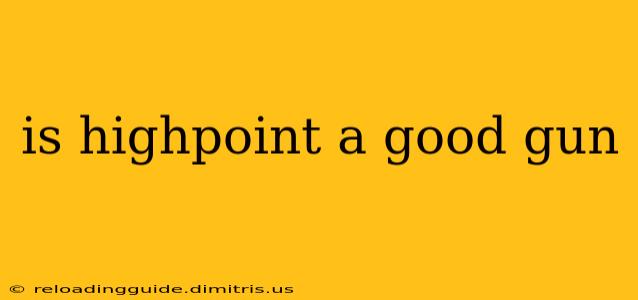Is Highpoint a Good Gun? A Comprehensive Look at Value, Reliability, and Performance
Highpoint firearms have a reputation. Some praise their affordability, while others criticize their perceived lack of quality. The truth, as with most things, lies somewhere in the middle. This article will delve into the pros and cons of Highpoint pistols and carbines, helping you decide if a Highpoint is the right firearm for you.
Understanding Highpoint's Position in the Market:
Highpoint firearms occupy a unique niche in the firearms market: budget-friendly, high-capacity handguns and carbines. They cater to buyers looking for a functional firearm without breaking the bank. This affordability comes with trade-offs, which we'll explore below.
Pros of Highpoint Firearms:
- Affordability: This is the undeniable king of Highpoint's advantages. Their firearms are significantly cheaper than many competitors, making them accessible to a wider range of buyers.
- High Capacity: Highpoint pistols and carbines often boast significantly higher magazine capacities than similarly priced competitors, offering more rounds per magazine. This can be advantageous for home defense or other situations where a larger magazine capacity is desired.
- Generally Reliable (with caveats): While Highpoint's reputation for reliability isn't universally stellar, many users report satisfactory performance, especially after proper break-in and cleaning. Issues tend to be more common with early models or those neglected in terms of maintenance.
- Simple Design: The design is straightforward and easy to maintain. This simplicity makes cleaning and basic repairs more manageable for less experienced gun owners.
Cons of Highpoint Firearms:
- Perceived Quality: Highpoint firearms often use polymer construction and simpler manufacturing processes, leading to a perceived lower quality compared to more established brands. This can manifest in rougher finishes or slightly less precise tolerances.
- Accuracy: While functional, Highpoint firearms generally aren't known for exceptional accuracy compared to higher-end firearms. This is not necessarily a deal-breaker for all users, especially those prioritizing capacity and affordability.
- Recoil: The heavier recoil experienced with some Highpoint models can be a significant factor for less experienced shooters or those with reduced physical strength.
- Aftermarket Support: The aftermarket support for Highpoint firearms is generally less extensive than for more popular brands. Finding replacement parts or custom accessories may be more challenging.
Who Should Consider a Highpoint Firearm?
Highpoint firearms are a viable option for specific users:
- Budget-conscious buyers: If affordability is your top priority, a Highpoint can provide a functional firearm without a large financial commitment.
- Home defense (with caveats): The high capacity can be an advantage for home defense, but remember accuracy and recoil are crucial factors to consider in this context.
- First-time gun owners (with caveats): Their simple design can be easier for beginners to maintain, but proper training and understanding of firearm safety remain paramount.
Who Should Avoid a Highpoint Firearm?
- Serious competitors or enthusiasts: If accuracy and performance are paramount, higher-end firearms from more established brands will generally offer a better shooting experience.
- Those prioritizing premium features and aesthetics: Highpoint's focus is on function and affordability, not luxury or premium features.
Conclusion:
Is a Highpoint a "good" gun? It depends on your needs and expectations. For budget-conscious buyers who prioritize high capacity and a functional firearm, a Highpoint can be a suitable choice. However, those seeking exceptional accuracy, premium quality, or extensive aftermarket support should explore other options. Always prioritize responsible gun ownership, including proper training and safe handling. Thorough research and consideration of individual needs are crucial before purchasing any firearm.

